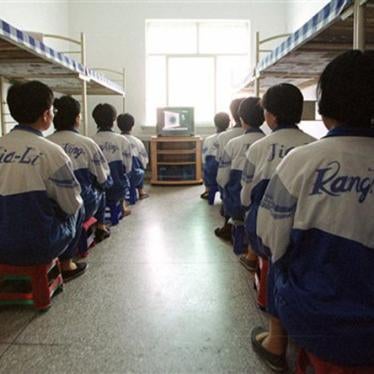(New York) – The Chinese Communist Party reinforced its monopoly on power in 2013 through tough new measures and hardline rhetoric, dashing hopes that the country’s new leadership would engage in deep systemic reforms to improve human rights and strengthen the rule of law, Human Rights Watch said today in its World Report 2014.
Although it announced the abolition of the abusive administrative detention system Re-education Through Labor, relaxation of the one-child policy, and plans to improve the delivery of justice, the new leadership of Xi Jinping and Li Keqiang has yet to embark on fundamental reforms that adequately respond to the public’s increased demands for justice and accountability.
“The Chinese government has responded to domestic and international pressure by announcing partial reforms on issues such as Re-education Through Labor and the one-child policy,” said Brad Adams, Asia director at Human Rights Watch, “But the leadership has also embarked on a harsh crackdown on critics, while using hardline rhetoric to make clear they have no intention of liberalizing the political system.”
In the 667-page report, Human Rights Watch reviews human rights practices in more than 90 countries. Syria’s widespread killings of civilians elicited horror but few steps by world leaders to stop it, Human Rights Watch said. A reinvigorated doctrine of “responsibility to protect” seems to have prevented some mass atrocities in Africa. Majorities in power in Egypt and other countries have suppressed dissent and minority rights. And Edward Snowden’s revelations about US surveillance programs reverberated around the globe.
Before the new leadership formally assumed power in March 2013, many in China had high expectations for reforms to address rising social tensions resulting from land seizures, forced evictions, corruption, pollution, poor treatment of migrant workers, discrimination based on residency status (“hukou”), imprisonment of activists, and other problems.
During the Chinese Communist Party 3rd plenum in November, the Party announced that it had decided to abolish Re-education Through Labor, which has allowed the detention of individuals for years without trial since the 1950s. It also announced relaxation of the birth quotas under the coercive family planning policy, allowing couples to have a second child if one of the parents is an only child. Following the Plenum, the Supreme People’s Court issued guidelines urging courts to strictly adhere to procedural protections in the revised Criminal Procedure Law, including prohibiting using confessions through torture as evidence at trial. The new leadership also announced its commitment to fight endemic corruption by striking at both “tigers and flies,” suggesting position and connections will no longer assure protection.
“It is too soon to know whether recently announced reforms will be matched by action to translate them into reality,” Adams said. “But while Xi Jinping has spoken a lot about tackling corruption and there have been some high profile arrests, the government has harshly retaliated against those who exposed high-level corruption in the government and Party.”
Beginning in March, China detained and arrested more than fifty activists across the country in an attempt to push back and reassert control over the acceptable boundaries for civil society activism. Those detained include activists involved with the New Citizens Movement, a civic platform that organizes street protests to press for the public disclosure of official assets as a mechanism to fight corruption. Many of these activists remain in detention.
In August, the Chinese government waged one of the harshest crackdowns on the Internet in recent years, railing against “online rumors,” detaining “rumor mongers” across the country, punishing outspoken citizens and journalists for blowing the whistle on corruption, and extending existing criminal legal provisions to make it easier to punish online expression.
The government continued to implement repressive policies in the minority areas of Tibet and Xinjiang. In Tibet, it maintained a massive security presence, severely restricted the movement of Tibetans, and stepped up surveillance of the local population by moving party cadres into every village. In Xinjiang, pervasive ethnic discrimination and severe religious repression continued to fuel rising tensions. More than one hundred people, including ethnic Uyghurs, Han, and others were killed in incidents that produced the highest collective toll since the July 2009 Urumqi riots. In both Tibet and Xinjiang, the government used live ammunition against peaceful protestors, injuring and killing some. In both areas the government is also carrying out involuntary population relocation and rehousing on a massive scale.
Among other concerns, this year’s World Report 2014 also highlighted:
- Nobel Peace Prize winner Liu Xiaobo continued his 11-year jail term in northern Liaoning Province. His wife Liu Xia remained under unlawful house arrest, reportedly suffering from severe depression;
- China continued to lead the world in executions. The exact number remained a state secret, but experts estimate it decreased progressively from about 10,000 a year a decade ago to less than 4,000 in recent years;
- After years of denial and inaction, the Ministry of Environmental Protection finally acknowledged the existence of “cancer villages,” with abnormally high cancer rates. Domestic media had written extensively on the issue. Victims have long pressed for justice and compensation with no consequences; and
- In May, China’s first-ever Mental Health Law came into effect, filling an important legal void but failing to close loopholes that allow government authorities and families to detain people in psychiatric hospitals against their will.
Human Rights Watch said that international pressure on China over rights was inconsistent in 2013, continuing a long-term trend. Many countries, such as the United Kingdom and France, toned down their criticism in summits with the Chinese leadership, instead touting “human rights dialogues” that are proven to achieve few, if any, results.
“China is home to more than a billion people and is a major global power, so how the rest of the world addresses its human rights situation is more vital than ever,” Adams said.







